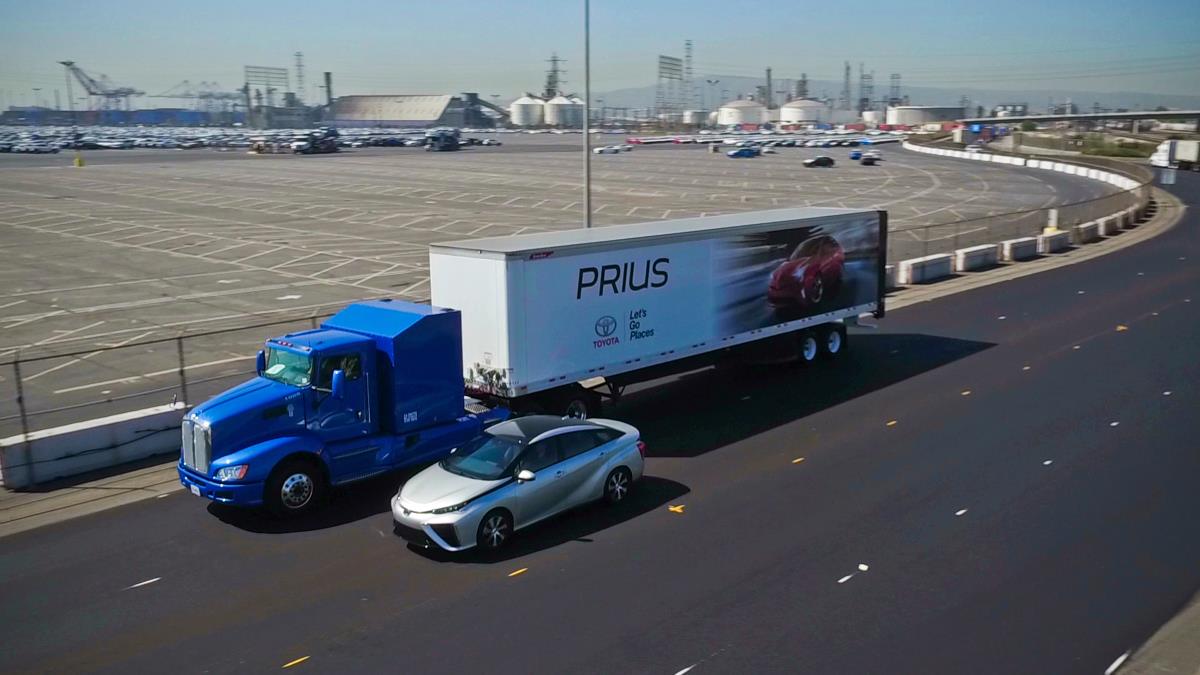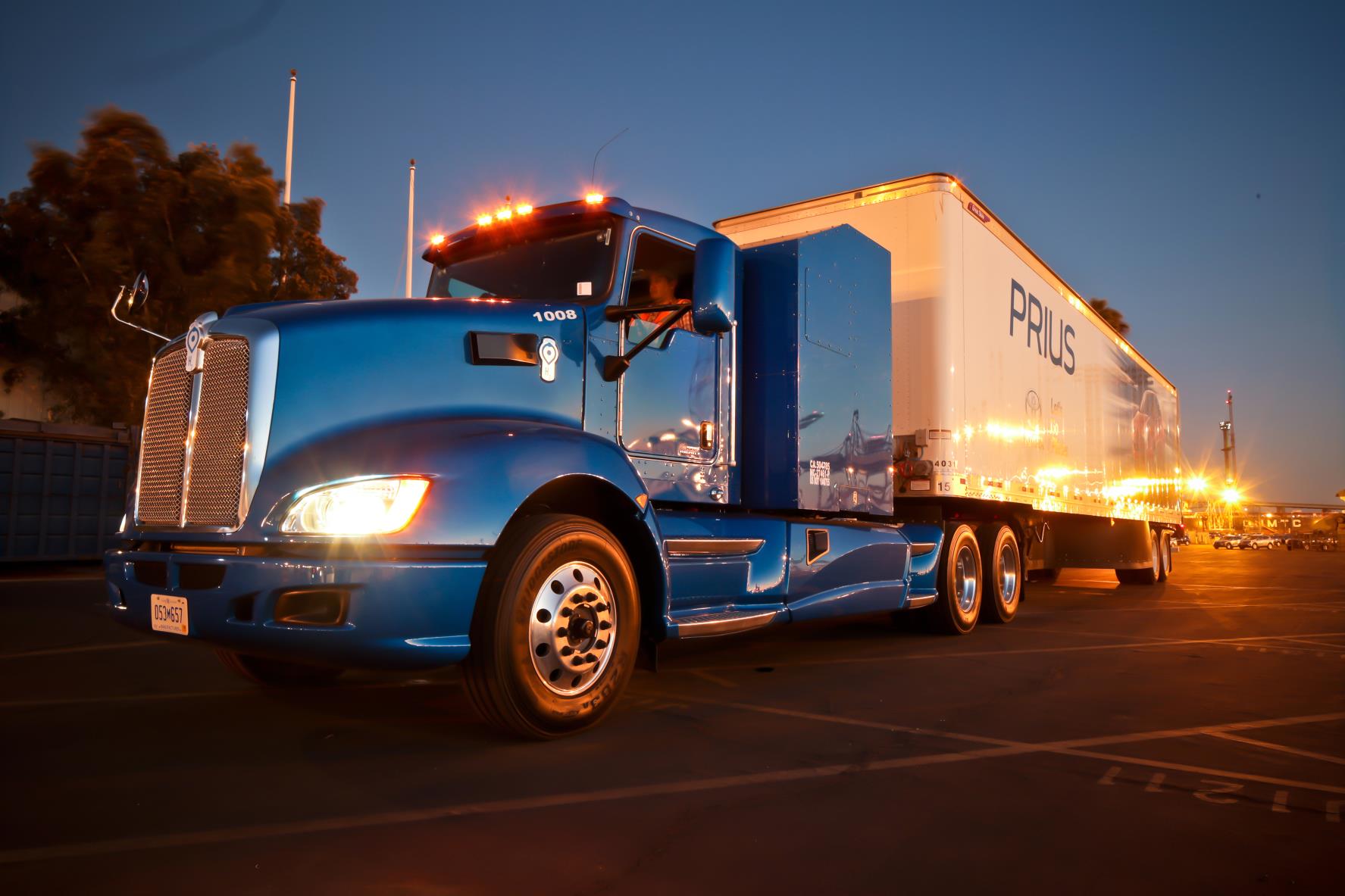Toyota drives the future of zero emission trucking
; Date: October 12, 2017
Tags: Toyota »»»» Fuel Cell Vehicles
Toyota has long held off from supporting electric vehicles, instead relying on hybrids and fuel cells as their contribution to cleaning up the transportation system. In this project Toyota is deploying prototype fuel-cell class 8 big rigs in the Port of Los Angeles area. The task of drayage trucks is delivering containers offloaded from ships at the port over to rail facilities a few miles away. Traditionally this has been done with regular diesel-powered big rigs, and as a result the area around the Port of Los Angeles is horribly polluted.

Project Portal starts drayage routes at Port of Los Angeles on October 23rd
Feasibility study examines potential usage of fuel cell technology in heavy-duty applications
TORRANCE, Calif. (October 12, 2017) - If you see a big-rig driving around the Ports of Los Angeles and Long Beach that seems oddly quiet and quick, do not be alarmed! It’s just the future.
The possible future of heavy-duty trucking recently hit the streets in the form of Toyota Motor North America, Inc.’s (TMNA) “Project Portal” – a hydrogen fuel cell system designed for heavy-duty truck use. The zero-emission class 8 truck proof of concept has completed more than 4,000 successful development miles, while progressively pulling drayage rated cargo weight, and emitting nothing but water vapor.
“Toyota has led the way in expanding the understanding and adoption of fuel cell technology,” said TMNA Executive Vice President Bob Carter. “From the introduction of the Mirai passenger vehicle to the creation of the heavy-duty fuel cell system in Project Portal, Toyota continues to demonstrate the versatility and scalability of the zero-emission fuel cell powertrain.”
With testing and development miles completed, Project Portal is ready to go to work. Initial feasibility study routes, moving goods from select Port of Los Angeles and Long Beach terminals to surrounding rail yards and warehouses for distribution, will begin on October 23rd. It’s estimated the truck’s daily trips will total around 200 miles. These localized, frequent route patterns are designed to test the demanding drayage duty-cycle capabilities of the fuel cell system while capturing real world performance data. As the study progresses, longer haul routes will be introduced.
The initial feasibility study operations will be managed by the TMNA Project Portal team, in collaboration with Toyota’s Service Parts Accessories Operations group and its drayage provider, Southern Counties Express (SCE).
Revealed in April 2017, Project Portal is the next step in Toyota’s effort to broaden the application of zero-emission fuel cell technology that can serve a range of industries. It is a fully functioning heavy duty truck with the power and torque capacity to conduct port drayage operations while producing zero emissions. Heavy duty vehicles make up a significant percentage of the annual emissions output at the Ports of Los Angeles and Long Beach, and the Portal feasibility study may provide another path to further reduce emissions.

The Project Portal heavy-duty truck concept generates more than 670 horsepower and 1,325 pound feet of torque from two Mirai fuel cell stacks and a 12kWh battery, a relatively small battery to support class 8 load operations. The concept’s gross combined weight capacity is 80,000 lbs., and its estimated driving range is more than 200 miles per fill, under normal drayage operation.
Toyota (NYSE:TM), the world's top automaker and creator of the Prius and the Mirai fuel cell vehicle, is committed to advancing mobility through our Toyota and Lexus brands. Over the past 50 years, we’ve produced more than 30 million cars and trucks in North America, where we operate 14 manufacturing plants (10 in the U.S.) and directly employ more than 44,000 people (more than 34,000 in the U.S.). Our 1,800 North American dealerships (1,500 in the U.S.) sold more than 2.8 million cars and trucks (nearly 2.5 million in the U.S.) in 2015 – and about 80 percent of all Toyota vehicles sold over the past 20 years are still on the road today.
Toyota partners with community, civic, academic, and governmental organizations to address our society’s most pressing mobility challenges. We share company resources and extensive know-how to support non-profits to help expand their ability to assist more people move more places.


